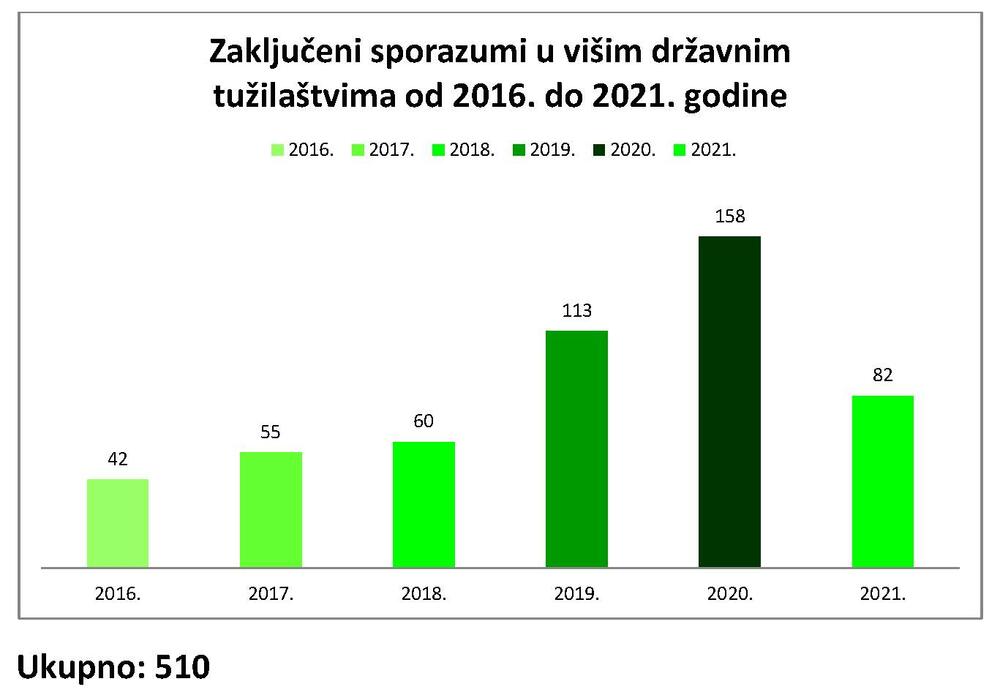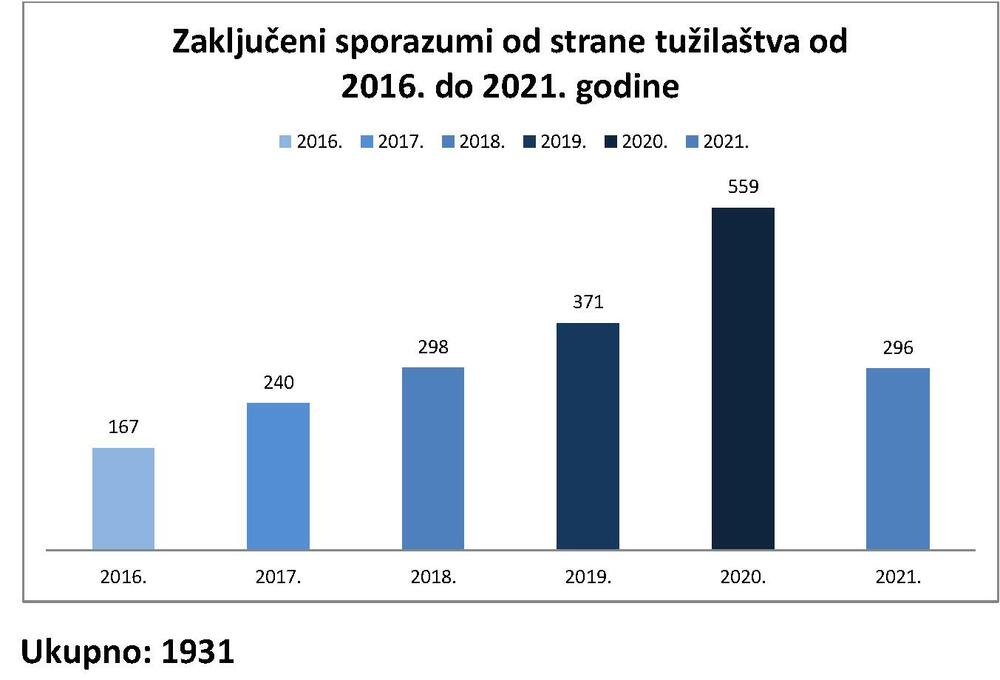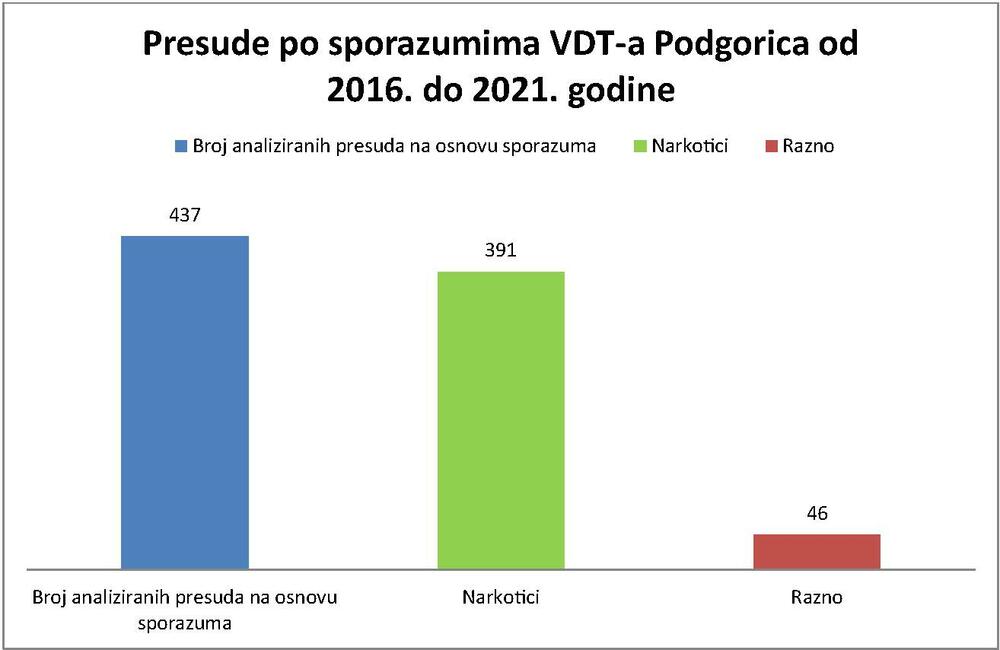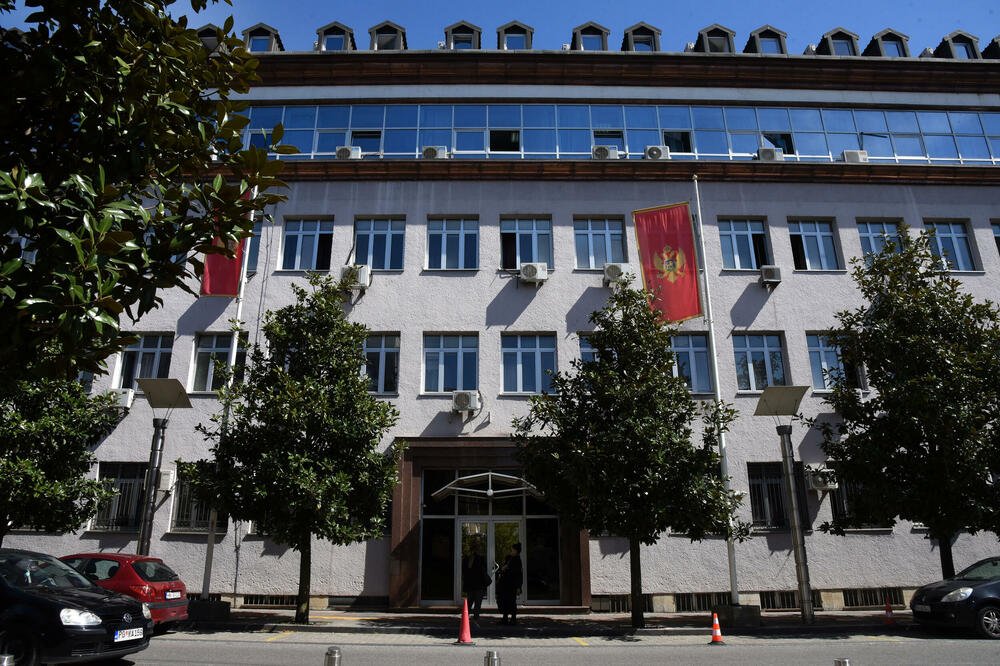According to the plea agreement, the accused received six months in prison for the sale of 1,7 grams of marijuana. Prosecutor Tatjana Begović she agreed with him to pay 10 euros. And two members of a criminal organization accused of international heroin and marijuana smuggling were sentenced to three months in prison each.
The former special prosecutor settled with them Mira Samardzic, who was much more tolerant than prosecutor Begović, bearing in mind that they were not only members of an international criminal group, but also returnees.
They were accused of having smuggled drugs from Albania to Montenegro at least eight times, namely 805 kilograms of marijuana and slightly less than a kilogram of heroin. The settlement signed by Samardžić was adopted by the judge of the Podgorica High Court Dragoje Jovic.
In another proceeding, a previously convicted member of a criminal organization, accused of smuggling 80 kilograms of marijuana and 3,2 kilograms of heroin, also agreed to serve only three months in prison. This agreement was made by the special prosecutor Tatjana Žižić, and adopted by the judge Biljana Uskoković.
In the explanations of these judgments, it is stated that the fact that they have already been convicted for selling drugs is not taken as an aggravating circumstance, because they did it within the same group!
And two members of another criminal organization, which smuggled hundreds of kilograms of marijuana around the region, received, after the settlement, three months of house arrest each. The two also have previous convictions. The judge Evica Durutović accepted the agreement, and in the explanation of the decision, she stated that the fact that they were returnees did not affect the verdict, since a certain amount of time had passed since the previous convictions, and the crimes in question were not the same.
These are just some of the controversial decisions based on the plea agreement, which were accepted by the High Court in Podgorica.

From the analysis of hundreds of judgments in which they had access Center for Investigative Journalism of Montenegro (CIN-CG) and the Center for Civil Liberties (CEGAS), numerous illogicalities are noticeable. Thus, it happened that in the same procedure for the same offense, the same or higher punishments were given to unconvicted persons, than to those who returned for committing criminal offenses.
Organizers of criminal groups in almost all cases received sentences below the legal minimum - about two years in prison, and a prison sentence of three to 15 years was threatened. It happened that, according to the agreements, in the same proceedings, a greater punishment was determined for the member than for the organizer of the criminal group.
Thus, the organizer of a criminal group that repeatedly smuggled a large amount of marijuana from Albania to Montenegro and the countries of the region received two years in prison, while two members of the same organization received one month and two months more in prison.
Prosecutor Mira Samardžić settled in that case, and the agreements were adopted by three different judges: Dragoje Jović, Dragica Vuković and Biljana Uskoković.
In addition, in numerous agreements due to the smuggling of large quantities of drugs, fines were not imposed. Although they did, they were mostly symbolic - a few thousand euros.
According to the information from the analyzed verdicts, the purchase price of a kilogram of marijuana on the market costs around 1.500 euros, while cocaine and heroin are many times more expensive. Resale, as written in the judgments, can earn up to five times more money. However, this is not a reason for many prosecutors to punish the perpetrators of these criminal acts with adequate monetary amounts, in order to act preventively.
According to the Criminal Code (CPC), the penalty for unauthorized production and trafficking of narcotic drugs is from two to 10 years, and can be reduced to a maximum of six months. In the judgments that we have seen, it is pointed out that for criminal offenses under the jurisdiction of the Special State Prosecutor's Office (SDT), a sentence of four or more years of imprisonment can be imposed.

Out of 639 verdicts based on plea agreements, which were submitted to CIN-CG and CEGAS, only in one case was a sentence of six years in prison for cocaine smuggling. All other sentences were under four years, mostly symbolic.
In 2012, the non-governmental organization "Human Rights Watch" announced that, according to settlements in the United States, those accused of criminal offenses related to intoxicants received an average of five and a half years in prison.
The court rejected only a few settlements of VDT
According to the prosecution's reports, the High Court in Podgorica rejected only a few settlements concluded by the Higher State Prosecutor's Office of the capital in the last six years. Agreements were rejected mainly due to the withdrawal of the defendants. In only one case, in 2016, the court rejected an agreement of eight months in prison for nine grams of heroin. He assessed that "the punishment is not proportionate to the gravity of the crime".
Out of 437 judgments according to the agreements of the Higher State Prosecutor's Office that we had for inspection, 391 decisions are related to the criminal offense of unauthorized production, possession and distribution of narcotic drugs. Other judgments refer mainly to cases of violent behavior, domestic violence and sexual offenses. In one of those agreements, the fact that he was a "family man" was counted as a particularly mitigating circumstance for a man who was convicted several times for domestic violence.

The institution of plea agreements in our judiciary, although it was introduced earlier, has been widely used since 2016. It is interesting that as time went on, the prosecutors proposed, and the judges adopted, increasingly lenient sentences. Thus, in 2016 and 2017, according to the settlements of the Podgorica Higher Prosecutor's Office, house arrest was not ordered in any case. However, in the last four years, in as many as a quarter of all the agreements of this prosecution, the convicted were punished with a nanoleg.
Returnees often received much lower prison sentences, even with the settlements of the Higher Prosecutor's Office in Podgorica, than those who committed the same criminal offense for the first time.
Thus, a person who was previously convicted twice, for theft and grievous bodily harm, agreed that he would only be sentenced to half a year of house arrest for selling narcotics. The agreement was concluded by the current Acting Supreme State Prosecutor, Maja Jovanović, and approved by the judge Predrag Tabas.
CIN-CG tried to get a comment from prosecutor Jovanović on the topic of wide use of the agreement in the Montenegrin judiciary, but we did not receive an answer until the publication of the text.
In another case, a person who had previously been convicted five times was sentenced to a year in prison by agreement for the criminal offense of unauthorized production and distribution of narcotic drugs. The settlement was also agreed upon by the current acting head of the VDT, Maja Jovanović, and confirmed by the judge Vesna Mostrokol.
In one of the verdicts, the five-time returnee agreed to go to prison for 11 months for attempted murder and illegal possession of a weapon. The same person was previously convicted of aggravated robbery, theft of a weapon, criminal offense against traffic safety, illegal trade, prolonged fraud and aggravated attempted theft. The agreement was concluded by the prosecutor Tanja Begović, and it was adopted by the judge of the High Court in Podgorica, Vesna Moštrokol.

After the agreement, a three-time returnee was sentenced to two and a half years in prison for attempted murder and illegal possession of weapons. Before that, he was convicted of violent behavior, assault on an official, and illegal possession of weapons and explosive materials. Current disciplinary prosecutor Danka Ivanović Djerić agreed, and judge Predrag Tabaš accepted that settlement.
The court approves the agreement if it determines that it does not violate the rights of the injured party. We did not receive an answer from the High Court to the question of how many cases the injured party appealed against the plea agreement decision, from 2016 until today, and what is the outcome of those proceedings.
Supreme Court: Mild penal policy for organized crime
Even in the documents of the Supreme Court, it is recognized that the punishments based on plea agreements for organized crime are mild.
"The application of the institute of mitigation of punishment, with the determination of particularly mitigating circumstances, which are most often expressed in judgments based on plea agreements, has led to the emergence of a trend of lenient punishment policies for criminal offenses in the field of organized crime, which is characterized by the imposition of sentences below the prescribed legal minimum" , concludes in the Analysis of the penal policy for the most serious crimes for 2017 and 2018.
In the Analysis, they warn that the legal possibility of applying plea agreements for criminal offenses in the field of organized crime can create an illusion among the perpetrators of these criminal offenses and the impression among the general public that these are lighter forms of crime, "which is why the question of achieving general and special prevention can be raised of organized crime".

The document also indicates that the courts, when assessing whether an agreement should be adopted, should pay more attention to whether all the requirements of the Criminal Procedure Code (CPC) are met, and especially whether the agreement is in accordance with the interests of fairness, and whether the punishment corresponds to the purpose of imposing a criminal sanction.
It is explained that in 90 percent of cases, the court imposed sentences below the limit prescribed by law, and that the application of plea agreements is represented in most cases of organized crime.
"The question arises as to whether previous convictions for other criminal offenses are underestimated when sentencing the offender," the analysis reads.
It is emphasized that when concluding a plea agreement, special attention should be paid to protecting the rights of the injured party.
German legal expert, dr Stefan Pirner, warns that in countries in transition, such as Montenegro, the inadequate application of plea agreements can have disastrous consequences for the rule of law.
Anglo-American literature also states that the institution of agreements in countries in transition can have "catastrophic consequences". It is emphasized that the settlements can further undermine the reputation of the judiciary among the population, who perceive the negotiations as "bargaining on the market".
All these warnings obviously had no impact, because the practice of a mild punishment policy for the most serious crimes of organized crime, according to the CIN-CG research, continued and practically made the institute of plea bargain in Montenegro meaningless.
Agreements as trade in justice
In legal systems in transition, the agreement is often perceived as "another further form of corruption" or "institutionalized form of bribery", points out the German lawyer, Dr. Štefan Pirner, in the "KoPra" magazine for sustainable and harmonious development of law.
"Such a legal institute, which may have been successful in its home country, will not be overly fruitful in another environment, just as a banana tree, for example, will not survive in Antarctica," the lawyer said vividly.
He points out that the absence of any guidelines for sentencing strengthens the position of the prosecution in negotiations, and that citizens may experience this as a kind of trade in justice.
Pirner adds that even the European Convention on Human Rights does not require a speedy conclusion of the procedure at any cost, i.e. at the cost of justice, but that it requires a fair procedure.

Bonus video:





